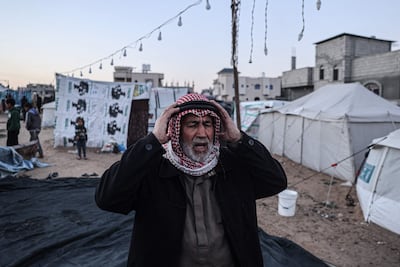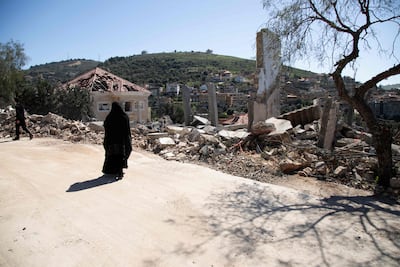The great Prussian military thinker Carl von Clausewitz coined one of the most identifiable concepts on warfare when he wrote that war was a continuation of politics by other means.
When Hamas launched its attacks against Israel on October 7 last year, some people speculated that the move was aimed at strengthening the Palestinians’ hand in any eventual negotiations with Israel – in other words, it fulfilled a national political objective. The only problem with that explanation was that Hamas has not identified any political objectives with regard to Israel since then.
On the contrary, the conditions that Hamas’s leader in Gaza, Yahya Sinwar, reportedly insisted upon in negotiations last week in Cairo were that Israel accept a permanent ceasefire in Gaza, a complete withdrawal of Israeli forces from the territory, and a return of the displaced, without conditions. In other words, Mr Sinwar merely sought a return to the status quo before October 7.
Fatah and the Palestinian Authority do at least want a settlement with Israel and the creation of a viable Palestinian state in the Occupied Territories
If there were political aims, we can only guess at what they are. To an extent Mr Sinwar perhaps aimed at imposing Hamas as the primary representative of the Palestinians, while marginalising Fatah. But that didn’t justify such a terrible cost in terms of lives and destruction, nor really answer what the Hamas endgame is. Fatah and the Palestinian Authority, in turn, at least do want a settlement with Israel and the creation of a viable Palestinian state in the Occupied Territories.
If Hamas sought to derail the Saudi-Israeli rapprochement, and in that way reaffirm the centrality of the Palestinian cause in the region, then surely it should have better gauged that the Israeli response to its killing of Israelis would be horrific. Indeed, so horrific, and comprehensive, that once Israel finished wreaking vengeance, Hamas’s ability to block any new Saudi-Israeli initiative down the road could be neutralised.
More probably, October 7 was primarily tied to internal calculations within Hamas, specifically a power play by Mr Sinwar to impose himself as the effective leader of the organisation, against the leadership in exile. If so, the attacks did have a political objective, but one that was ruinously parochial, devastated Gaza, and has now created a dilemma for Hamas and its allies, above all Hezbollah.
For the past five months, there has been a genuine war in south Lebanon, with major damage in border towns and a significant loss of life among Lebanese civilians. Hezbollah’s secretary general, Hassan Nasrallah, has described his party’s actions as providing a “support front” for Gaza. But did opening a front on behalf of a Hamas that has no discernible national political objectives merit what has happened to large parts of southern Lebanon, not to mention to numerous party cadres?
Hezbollah did so primarily because it had to keep up the facade of a united front of “axis of resistance” groups that Iran has promoted. As a result, Iran has benefited, but its Arab allies have paid (and continue to pay) a heavy price.
The core concerns of Hamas and Hezbollah have been kicked out of joint because of Iran’s priorities. The “unity of the arenas” strategy formulated last year may have allowed Mr Sinwar to think that he could strengthen his hand within Hamas. Since Gaza was central in the strategy, he, the principal Hamas figure in Gaza, could use this to muscle his way into leading the organisation.
Hezbollah showed more common sense. From the start, Mr Nasrallah was forced to take Lebanese realities into consideration. The party, because of its experience in governing and familiarity with Lebanon’s sectarian makeup, understood the risks of the “unity of the arenas” approach, therefore grasped its limitations.
More profoundly, Hezbollah also probably sensed that a major problem was the absence of an overriding political aim in the “unity of the arenas” strategy, other than to reaffirm that Iran was in control of a wide network of friendly military forces spread across the Middle East, therefore could not be circumvented.
With Hamas and Hezbollah both prisoners of a conflict in which they’ve embarked, their only path out of their dilemma is to return to the situation prevailing before October. There are obvious costs with such an attitude, since it will lead their followers to seriously question whether their sacrifice was necessary.
But both in Gaza and Lebanon, a return to the status quo ante may be difficult. Gaza is certainly not going back to where it was on October 6. Lebanon may be different, but only if Hezbollah makes some concessions, albeit cosmetic ones. However, this might also reopen the door to an uncomfortable debate about the party’s weapons and its right to carry Lebanon into a war on its own.
The war has not been a continuation of national policy by other means in Gaza and Lebanon. Rather, it is mainly a continuation of personal ambition by other means, in Mr Sinwar’s case, and of Iranian interests in Hezbollah’s. Palestinians and Lebanese have suffered from a war fought in their name in which they had no say. Once the conflict ends, Iran and its allies will have to reassess their situation.
Groom and Two Brides
Director: Elie Semaan
Starring: Abdullah Boushehri, Laila Abdallah, Lulwa Almulla
Rating: 3/5
Terror attacks in Paris, November 13, 2015
- At 9.16pm, three suicide attackers killed one person outside the Atade de France during a foootball match between France and Germany
- At 9.25pm, three attackers opened fire on restaurants and cafes over 20 minutes, killing 39 people
- Shortly after 9.40pm, three other attackers launched a three-hour raid on the Bataclan, in which 1,500 people had gathered to watch a rock concert. In total, 90 people were killed
- Salah Abdeslam, the only survivor of the terrorists, did not directly participate in the attacks, thought to be due to a technical glitch in his suicide vest
- He fled to Belgium and was involved in attacks on Brussels in March 2016. He is serving a life sentence in France
The%20specs
%3Cp%3E%3Cstrong%3EEngine%3A%20%3C%2Fstrong%3E6.5-litre%20V12%3Cbr%3E%3Cstrong%3EPower%3A%20%3C%2Fstrong%3E725hp%20at%207%2C750rpm%3Cbr%3E%3Cstrong%3ETorque%3A%20%3C%2Fstrong%3E716Nm%20at%206%2C250rpm%3Cbr%3E%3Cstrong%3ETransmission%3A%20%3C%2Fstrong%3E8-speed%20dual-clutch%20auto%3Cbr%3E%3Cstrong%3EOn%20sale%3A%20%3C%2Fstrong%3EQ4%202023%3Cbr%3E%3Cstrong%3EPrice%3A%20%3C%2Fstrong%3EFrom%20Dh1%2C650%2C000%3C%2Fp%3E%0A
Fitness problems in men's tennis
Andy Murray - hip
Novak Djokovic - elbow
Roger Federer - back
Stan Wawrinka - knee
Kei Nishikori - wrist
Marin Cilic - adductor
The specs: 2018 Volkswagen Teramont
Price, base / as tested Dh137,000 / Dh189,950
Engine 3.6-litre V6
Gearbox Eight-speed automatic
Power 280hp @ 6,200rpm
Torque 360Nm @ 2,750rpm
Fuel economy, combined 11.7L / 100km
BORDERLANDS
Starring: Cate Blanchett, Kevin Hart, Jamie Lee Curtis
Director: Eli Roth
Rating: 0/5
Thor: Ragnarok
Dir: Taika Waititi
Starring: Chris Hemsworth, Tom Hiddleston, Cate Blanchett, Jeff Goldblum, Mark Ruffalo, Tessa Thompson
Four stars
EA Sports FC 26
Publisher: EA Sports
Consoles: PC, PlayStation 4/5, Xbox Series X/S
Rating: 3/5
UAE currency: the story behind the money in your pockets
Kandahar%20
%3Cp%3E%3Cstrong%3EDirector%3A%3C%2Fstrong%3E%20Ric%20Roman%20Waugh%3C%2Fp%3E%0A%3Cp%3E%3Cstrong%3EStars%3A%C2%A0%3C%2Fstrong%3EGerard%20Butler%2C%20Navid%20Negahban%2C%20Ali%20Fazal%3C%2Fp%3E%0A%3Cp%3E%3Cstrong%3ERating%3A%3C%2Fstrong%3E%202.5%2F5%3C%2Fp%3E%0A
Company%C2%A0profile
%3Cp%3E%3Cstrong%3EDate%20started%3A%20%3C%2Fstrong%3EMay%202022%3Cbr%3E%3Cstrong%3EFounder%3A%20%3C%2Fstrong%3EHusam%20Aboul%20Hosn%3Cbr%3E%3Cstrong%3EBased%3A%20%3C%2Fstrong%3EDIFC%3Cbr%3E%3Cstrong%3ESector%3A%20%3C%2Fstrong%3EFinTech%20%E2%80%94%20Innovation%20Hub%3Cbr%3E%3Cstrong%3EEmployees%3A%20%3C%2Fstrong%3Eeight%3Cbr%3E%3Cstrong%3EStage%3A%20%3C%2Fstrong%3Epre-seed%3Cbr%3E%3Cstrong%3EInvestors%3A%20%3C%2Fstrong%3Epre-seed%20funding%20raised%20from%20family%20and%20friends%20earlier%20this%20year%3C%2Fp%3E%0A
Specs
Engine: Dual-motor all-wheel-drive electric
Range: Up to 610km
Power: 905hp
Torque: 985Nm
Price: From Dh439,000
Available: Now
Leading all-time NBA scorers
Kareem Abdul-Jabbar 38,387
Karl Malone 36,928
Kobe Bryant 33,643
Michael Jordan 32,292
LeBron James 31,425
Wilt Chamberlain 31,419
The%20end%20of%20Summer
%3Cp%3EAuthor%3A%20Salha%20Al%20Busaidy%3C%2Fp%3E%0A%3Cp%3EPages%3A%20316%3C%2Fp%3E%0A%3Cp%3EPublisher%3A%20The%20Dreamwork%20Collective%C2%A0%3C%2Fp%3E%0A
Specs
Engine: Electric motor generating 54.2kWh (Cooper SE and Aceman SE), 64.6kW (Countryman All4 SE)
Power: 218hp (Cooper and Aceman), 313hp (Countryman)
Torque: 330Nm (Cooper and Aceman), 494Nm (Countryman)
On sale: Now
Price: From Dh158,000 (Cooper), Dh168,000 (Aceman), Dh190,000 (Countryman)
More from Rashmee Roshan Lall
Global Fungi Facts
• Scientists estimate there could be as many as 3 million fungal species globally
• Only about 160,000 have been officially described leaving around 90% undiscovered
• Fungi account for roughly 90% of Earth's unknown biodiversity
• Forest fungi help tackle climate change, absorbing up to 36% of global fossil fuel emissions annually and storing around 5 billion tonnes of carbon in the planet's topsoil
Islamophobia definition
A widely accepted definition was made by the All Party Parliamentary Group on British Muslims in 2019: “Islamophobia is rooted in racism and is a type of racism that targets expressions of Muslimness or perceived Muslimness.” It further defines it as “inciting hatred or violence against Muslims”.
if you go
The flights
Fly to Rome with Etihad (www.etihad.ae) or Emirates (www.emirates.com) from Dh2,480 return including taxes. The flight takes six hours. Fly from Rome to Trapani with Ryanair (www.ryanair.com) from Dh420 return including taxes. The flight takes one hour 10 minutes.
The hotels
The author recommends the following hotels for this itinerary. In Trapani, Ai Lumi (www.ailumi.it); in Marsala, Viacolvento (www.viacolventomarsala.it); and in Marsala Del Vallo, the Meliaresort Dimore Storiche (www.meliaresort.it).
The more serious side of specialty coffee
While the taste of beans and freshness of roast is paramount to the specialty coffee scene, so is sustainability and workers’ rights.
The bulk of genuine specialty coffee companies aim to improve on these elements in every stage of production via direct relationships with farmers. For instance, Mokha 1450 on Al Wasl Road strives to work predominantly with women-owned and -operated coffee organisations, including female farmers in the Sabree mountains of Yemen.
Because, as the boutique’s owner, Garfield Kerr, points out: “women represent over 90 per cent of the coffee value chain, but are woefully underrepresented in less than 10 per cent of ownership and management throughout the global coffee industry.”
One of the UAE’s largest suppliers of green (meaning not-yet-roasted) beans, Raw Coffee, is a founding member of the Partnership of Gender Equity, which aims to empower female coffee farmers and harvesters.
Also, globally, many companies have found the perfect way to recycle old coffee grounds: they create the perfect fertile soil in which to grow mushrooms.
UAE currency: the story behind the money in your pockets
The National's picks
4.35pm: Tilal Al Khalediah
5.10pm: Continous
5.45pm: Raging Torrent
6.20pm: West Acre
7pm: Flood Zone
7.40pm: Straight No Chaser
8.15pm: Romantic Warrior
8.50pm: Calandogan
9.30pm: Forever Young
Start-up hopes to end Japan's love affair with cash
Across most of Asia, people pay for taxi rides, restaurant meals and merchandise with smartphone-readable barcodes — except in Japan, where cash still rules. Now, as the country’s biggest web companies race to dominate the payments market, one Tokyo-based startup says it has a fighting chance to win with its QR app.
Origami had a head start when it introduced a QR-code payment service in late 2015 and has since signed up fast-food chain KFC, Tokyo’s largest cab company Nihon Kotsu and convenience store operator Lawson. The company raised $66 million in September to expand nationwide and plans to more than double its staff of about 100 employees, says founder Yoshiki Yasui.
Origami is betting that stores, which until now relied on direct mail and email newsletters, will pay for the ability to reach customers on their smartphones. For example, a hair salon using Origami’s payment app would be able to send a message to past customers with a coupon for their next haircut.
Quick Response codes, the dotted squares that can be read by smartphone cameras, were invented in the 1990s by a unit of Toyota Motor to track automotive parts. But when the Japanese pioneered digital payments almost two decades ago with contactless cards for train fares, they chose the so-called near-field communications technology. The high cost of rolling out NFC payments, convenient ATMs and a culture where lost wallets are often returned have all been cited as reasons why cash remains king in the archipelago. In China, however, QR codes dominate.
Cashless payments, which includes credit cards, accounted for just 20 per cent of total consumer spending in Japan during 2016, compared with 60 per cent in China and 89 per cent in South Korea, according to a report by the Bank of Japan.
KILLING OF QASSEM SULEIMANI





